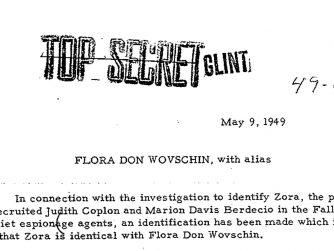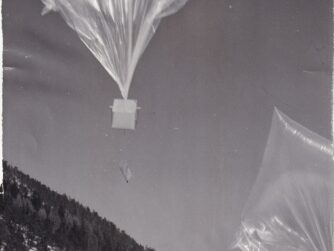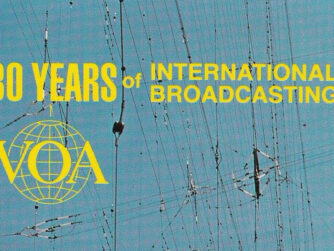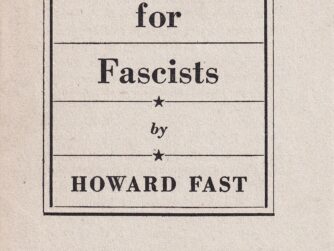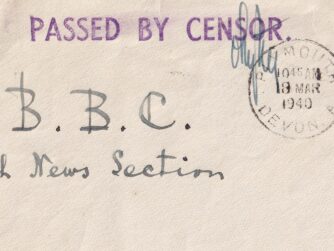End of Career and Legacy
Barmine was eventually forced out of his position in the VOA Russian Branch in 1964, and a Foreign Service officer, Terrence Catherman, was brought to replace him. Alexander Frenkley talked about Barmine’s departure from VOA in an oral history interview:
I don't know who decided on Barmine's transfer, but I assume it was in conjunction with the State Department, the leadership of USIA, to a great extent under the influence of our Embassy in Moscow. Barmine left in February of 1964, appointed to the headquarters of USIA as a special consultant, assistant, whatever, to the head of the area office.1
A column in a conservative newspaper Human Events, on February 1, 1964, said that “Alexander Barmine, a former Russian general and a tough anti-Communist, was cashiered from his job as head of the Russian desk.” Human Events reported that Barmine was in trouble with his USIA superiors for slipping in ‘provocative’ programs which were beamed to Russia.” The short note in the newspaper also stated that USIA’s new chief, Carl Rowan, who had succeeded Edward R. Murrow, “plans to expand non-controversial radiocasts to Russia.”2
According to Foreign Service Officer Hans H. Tuch, who held a number of positions at the United States Information Agency and the Voice of America, Edward R. Murrow, the new USIA director in the Kennedy administration, was behind the removal of Alexander Barmine from his VOA Russian Service chief’s job and his transfer to a largely meaningless job the USIA headquarters building. Tuch said in a 1989 interview with G. Lewis Schmidt for the Association for Diplomatic Studies and Training Foreign Affairs Oral History Project that Edward R. Murrow “wanted to have an American with experience in the Soviet Union, an American officer who spoke Russian with recent experience to be the head of the VOA Soviet division.”3
He was a very conservative, I would say, almost reactionary, military type who just brooked no interference with what he thought should be broadcast to the Soviet Union. However, he was very well-known and highly regarded on the hill, Congress.
Yet, Ed Murrow felt that a change of direction was in order and needed to be taken. So he worked out a system wheeby Terry Catherman, who had succeeded me in Moscow, when he came back in 1964, took over the Russian division of the Voice of America. But what could be done with Alexander Barmine?
So an arrangement was devised whereby Alex Barmine was “promoted” to be my special assistant. I was the area director and he was to be my Soviet advisor in the area. We brought him uptown and he was treated courteously; he was given a nice office right next to my office and from time to time Ed Murrow greeted him and talked to him briefly and made Alex Barmine feel good. He did not feel that he had been demoted.
I remember on one occasion when I was invited to the Soviet Embassy for a reception, I said to Alex, “You've got to come along with me. You're the Soviet expert in this and you come along with me, and I'll see to it that you get an invitation.” They indeed sent him an invitation. He was at first very reluctant to go into the Soviet Embassy, but finally agreed. We went to the Soviet Embassy and, lo and behold, he became the center of attraction to all the military types, Soviet military types at the Soviet Embassy who had remembered this famous General Barmine of the 1930s. He enjoyed it. Then, on the way out he told me the story about his defection from his embassy, the Soviet Embassy in Athens, when he walked out knowing that if he had not walked out of that embassy at the moment he did, he would have been arrested and possibly shot.4
Mark Pomar, former assistant director of the Russian Service at Radio Free Europe/Radio Liberty and former director of the USSR Division at the Voice of America, wrote in his Cold War Radio book that when he joined VOA, “Barmine was long gone, but stories about him still circulated. He had been feared by many of the old timers but also deeply admired for the way he stood up to American management and supported an independently minded Russian Service.”5
Victor Franzusoff, a former chief of the Russian Service, was born in Russia in 1911 and died in 1996 in Silver Spring, Maryland. He had highly positive comments about Alexander Barmine when he worked under him for 15 years. Barmine held the position of the chief of the Russian Service or Branch longer than any other person in that job. Franzusoff described him in his book Talking to the Russians as “effective and charismatic” and “respected by the government community outside VOA as well.”6 According to Franzusoff, it was Barmine who prepared Vice President Richard Nixon for the famous “Kitchen Debate” with Soviet Premier Nikita Khrushchev during Nixon’s visit to the opening of the American National Exhibition in Moscow on July 24, 1959. Franzusoff wrote, “Nixon’s success in that debate owed a lot to Barmine’s knowledge of Soviet confrontation style.”7 This is how Franzusoff described Barmine’s appearance and personality:
Barmine was tall, handsome man and a true commander. He tolerated no back-talk or insubordination from anyone in his command, and yet he had our complete respect and loyalty. He was strict and he enjoyed his authority, but he did not quibble about minor points. He made up his mind quickly, whether it was to approve a broadcast script or to overrule a subordinate's decision.8
Franzusoff revealed in his book that even while living in the United States, Barmine was still afraid of KGB assassination plots against him. He once told Franzusoff not to stand too close to the subway platform’s edge “because you never know who might be standing behind you.”9 He and Barmine socialized after work, but Barmine insisted that Franzusoff continue to address him formally at the office.
According to Franzusoff, Barmine’s standing with VOA’s American management may have started to decline already during the Kennedy administration with the appointment of Edward R. Murrow as the director of the U.S. Information Agency (USIA). Murrow, who was a strong critic of McCarthy who falsely accused him of pro-Soviet reporting, reappointed Reed Harris, whom Barmine and others criticized during the 1953 McCarthy hearings, to a position at USIA. During World War II, Murrow was reporting accurately that the Soviets were responsible for murdering thousands of Polish POW officers at Katyn when many American journalists and the entire Voice of America and the Office of War Information accepted and repeated the Soviet lie.
I require no lectures from the junior Senator from Wisconsin as to the dangers or terrors of Communism. Having watched the aggressive forces at work in Western Europe, having had friends in Eastern Europe butchered and driven into exile, having broadcast from London in 1943 that the Russians were responsible for the Katyn massacre, having told the story of the Russian refusal to allow allied aircraft to land on Russian fields after dropping supplies to those who rose in Warsaw -- and then were betrayed by the Russians -- and having been denounced by the Russian radio for these reports, I cannot feel that I require instruction from the Senator on the evils of Communism.10
Franzusoff observed that Murrow’s speech at the twentieth anniversary of the Voice of America in February 1962 “did point to a shift of emphasis away from the zealous anti-communist stance associated with Alexander Barmine, director of the Russian Service.”11 However, Murrow’s speech in 1962 did not differ greatly from what he said in response to Senator McCarthy in 1954. Murrow himself was a Cold Warrior of the best kind. Barmine continued to be the head of VOA Russian programs during the Kennedy administration while Murrow was in charge of USIA. He was transferred from the Russian Branch to an insignificant job at USIA in 1964 at the start of the Johnson administration when Murrow was absent due to illness or had already resigned. Franzusoff described Barmine then as “becoming more and more eccentric and irascible, perhaps feeling under-appreciated as a patriotic Cold Warrior.”12 According to Franzusoff, before his transfer to USIA, Barmine objected to adding more VOA broadcasting hours in Russian without adequate personnel and support. At the same time, Franzusoff told the management that he would support the project as proposed. The Russian Service was split into two units: the News and Commentary Branch and the Cultural Branch. Franzusoff was chosen as the chief of the News and Commentary Branch. In pursuing the policy of building bridges with the Soviets, set by the U.S. Information Agency and the State Department and supported by VOA’s senior management, Franzusoff interviewed Soviet athletes and some government officials. But the era of detente with the Soviet Union did not bring the desired change in the behavior of the Soviet regime, even though under pressure from it, the Nixon and Ford administrations banned Franzusoff from interviewing Nobel Prize-winning dissident writer Alexandr Solzhenitsyn and prevented the Russian Service from broadcasting extended excerpts from his book, The Gulag Archipelago.13 Fortunately, similar restrictions were not imposed on Radio Liberty and Radio Free Europe.
Barmine continued to serve as a senior adviser on Soviet affairs at the United States Information Agency from 1964 until his retirement in 1972 but did not do any meaningful work during that time. He was reported to have been isolated and depressed. The return of pro-Soviet censorship at the Voice of America could have been one reason for his disappointments toward the end of his life. Ralph de Toledano, a writer and editor at Newsweek and the National Review, wrote in his Washington Times column on December 4, 1985, that “Alexander Barmine, a brilliant young Red Amy general who broke with Stalin, was hounded to the edge of insanity and over.”14
By that time, the Reagan administration had already lifted all the written and unwritten restrictions at the Voice of America on exposing communist crimes and criticizing the Soviet regime. During the Reagan years, Alexandr Solzhenitsyn was interviewed by the Russian Service and read from his books for VOA audiences in the Soviet Union. President Reagan made the Voice of America again effective in countries like Poland, where in the 1980s, VOA’s audience more than quadrupled when I served as the service chief, and the independent Solidarity trade union launched a successful struggle for democracy and independence from the Soviet Union. Barmine died aged 88 on December 25, 1987, in Rockville, Maryland, not too long before the fall of communism in East-Central Europe and the disillusion of the Soviet empire. I regret never having met this remarkable man in person.
Alexander Barmine’s career with the U.S. government, his books, articles, and congressional testimonies offer an educational glimpse into how the Voice of America operated during the Cold War. Renowned American literary critic Edmund Wilson, who opposed the U.S. government’s policies against the Soviet Union and for several years refused to pay taxes to avoid supporting what he saw as official American hostility toward Russia, highly praised in a New Yorker magazine review Barmine’s 1945 book, One Who Survived:
For a foreigner who really wants to learn what has been happening of recent years in Russia––as distinguished from demanding support either for faith or for hostile prejudice––this is probably the one book that ought to be read.15
Barmine was one of the first high-level Soviet defectors. His book One Who Survived was translated into 23 languages. Only thanks to such courageous anti-communist writers and journalists like him, U.S. funded broadcasters––Radio Free Europe, Radio Liberty, and the Voice of America––were able to have an impact that eventually helped to bring about the collapse of communism in Eastern Europe and the fall of the Soviet Union.

NOTES:
- Alexander Frenkley, Interviewed by: Cliff Groce.
- Human Events, “Capitol Camera,” February 1, 1964, https://www.cia.gov/readingroom/docs/CIA-RDP75-00149R000600160113-7.pdf.
- The Association for Diplomatic Studies and Training Foreign Affairs Oral History Project Information Series, “Interview with Huns H. Tuch.” Interviewed by: G. Lewis Schmidt, August 4, 1989, http://www.loc.gov/item/mfdipbib001194.
- Ibid.
- Mark G. Pomar, Cold War Radio: The Russian Broadcasts of the Voice of America and Radio Free Europe/Radio Liberty (Lincoln: Potomac Books, an imprint of the University of Nebraska Press, 2022), p. 37.
- Victor Franzusoff, Talking to the Russians, p. 114
- Ibid.
- Ibid.
- Ibid. p. 115.
- “Edward R. Murrow - Response to McCarthy on CBS’ See It Now – April 13, 1954,” American Rhetoric – Online Speech Bank, accessed March 30, 2023, https://www.americanrhetoric.com/speeches/edwardrmurrowtomccarthy.htm.
- Ibid., p. 122.
- Franzusoff, p. 123.
- Ibid. pp. 180-184. Also see Ted Lipien, “SOLZHENITSYN Target of KGB Propaganda and Censorship by Voice of America,” Cold War Radio Museum (blog), November 7, 2017, http://www.coldwarradiomuseum.com/solzhenitsyn-target-of-kgb-propaganda-and-censorship-by-voice-of-america/.
- Ralph de Toledano, “A weirdo case that shifts our attention,” The Washington Times, December 4, 1985, https://www.cia.gov/readingroom/docs/CIA-RDP90-00965R000201520005-0.pdf.
- Esther Iverem, "Alexander G. Barmine, 88, Dies; Early High-Level Soviet Defector, The New York Times, December 28, 1987, https://timesmachine.nytimes.com/timesmachine/1987/12/28/issue.html.



